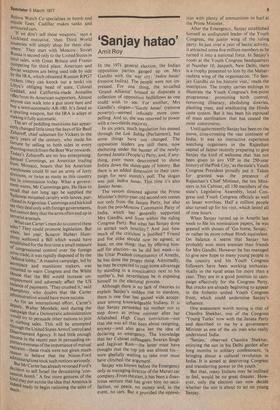'Sanjay hatao'
Amit Roy In the 1971 general election, the Indian opposition parties ganged up on Mrs Gandhi with the war cry : 'Indira hatao' (remove Indira). The people were not impressed. For one thing, the so-called 'Grand Alliance' housed as disparate a collection of opposition bedfellows as one could wish to see. For another, Mrs Gandhi's slogan---`Garibi hatao' (remove poverty)—seemed infinitely more compelling. And so, she was returned to power with a two-thirds majority.
In six years, much legislation has•passed through the Lok Sabha (Parliament), but some things have not changed. The opposition leaders are still there, now sheltering under the banner of the newlyformed Janata (People's) Party, and, if anything, even more determined to shove Indira down the sluice-gate of history. But there is an added dimension to their campaign for next month's poll. The slogan was just Indira hatao. This time it's also Sanjay hatao.
The venom directed against the Prime Minister's thirty-year-old second son comes not only from the Janata Party, but also from the pro-Moscow Communist Party of India, which has generally supported Mrs Gandhi, and from within the ruling Congress Party. But what has Sanjay done to attract such hostility ? And just how much of the criticism is justified ? Friend and foe alike should now be agreed, at least, on one thing: that by offering himself for election—as he did last week—in the Uttar Pradesh constituency of Amethi, he has done the proper thing. Admittedly, he may be expected to reap some advantage by standing in a constituency next to his mother's, but nevertheless he is exposing himself to the electoral process.
Although there is no lack of theories to explain Sanjay's sudden rise to stardom, there is one that has gained wide acceptance among knowledgeable Indians. It is that Sanjay persuaded his mother not to step down as prime minister after her Allahabad High Court conviction—not that she was all that keen about resigning, anyway—and also gave her the idea of declaring an emergency. The knowledge that her Cabinet colleagues, Swaran Singh and Jagjivan Ram—the latter must have thought that the top job was almost his— were gleefully waiting to take over must have clinched the argument.
Sanjay was known before the Emergency only as managing director of the Maruti car company. From the start, it has been a disastrous venture that has given him no satisfaction, no peace, no money and, in the event, no cars. But it provided the opposi
tion with plenty of ammunition to hurl at the Prime Minister.
After the Emergency, Sanjay established himself as undisputed leader of the Youth Congress, the junior wing of the ruling party. In just over a year of hectic activity, it attracted some five million members as he turned it into a national force. In Sanjay's room at the Youth Congress headquarters at Number 10, Janpath, New Delhi, there is a trophy presented to him by the Maharrashtra wing of the organisation. 'To Sanjay Gandhi on his historic visit,' reads the inscription. The trophy carries etchings to illustrate the Youth Congress's five-point programme: promoting birth control, removing illiteracy, abolishing dowries, planting trees, and eradicating the Hindu caste system. But it has been his espousal of mass sterilisation that has caused the most controversy.
Until quite recently Sanjay has been on the move, criss-crossing the vast continent of India. It was an instructive experience watching organisers in the Rajasthan capital of Jaipur recently preparing to give Sanjay the kind of welcome that 'has not been given to any VIP in the 250-year history of the Pink City,' as the stat'e's Youth Congress President proudly put it. Taken for granted was the presence of Rajasthan's Chief Minister, the ten Ministers in his Cabinet, all 150 members of the state's Legislative Assembly, local Congress and Youth Congress officials as well as lesser worthies. Half a million people also turned up for his visit, which lasted all of nine hours.
When Sanjay turned up in Amethi last week to file his nomination papers, he was greeted with shouts of `Go home, Sanjay,' or rather its more robust Hindi equivalent. On balance it seems that Sanjay has probably won more enemies than friends for Mrs Gandhi. However he has managed to give new hope to many young people in the country and his Youth Congress followers have been working enthusiastically in the rural areas for more than a year. They are in a good position to campaign effectively for the Congress Party. But cracks are already beginning to appear in the hitherto united Yonth Congress front, which could undermine Sanjay's influence.
One assessment worth noting is that of Chandra Shekhar, one of the Congress 'Young Turks' now with the Janata Party and described to me by a government Minister as one of the six men who really understand India.
'Sanjay,' observed Chandra Shekhar, enjoying the sun in his Delhi garden after long months in solitary confinement, 'is bringing about a cultural revolution in India. It is aimed at destroying Congress and transferring power to the youth.'
• But that, many Indians may be inclined to feel, would be no great disaster. However, only the election can now decide whether the sun is about to set on young Sanjay.


































 Previous page
Previous page